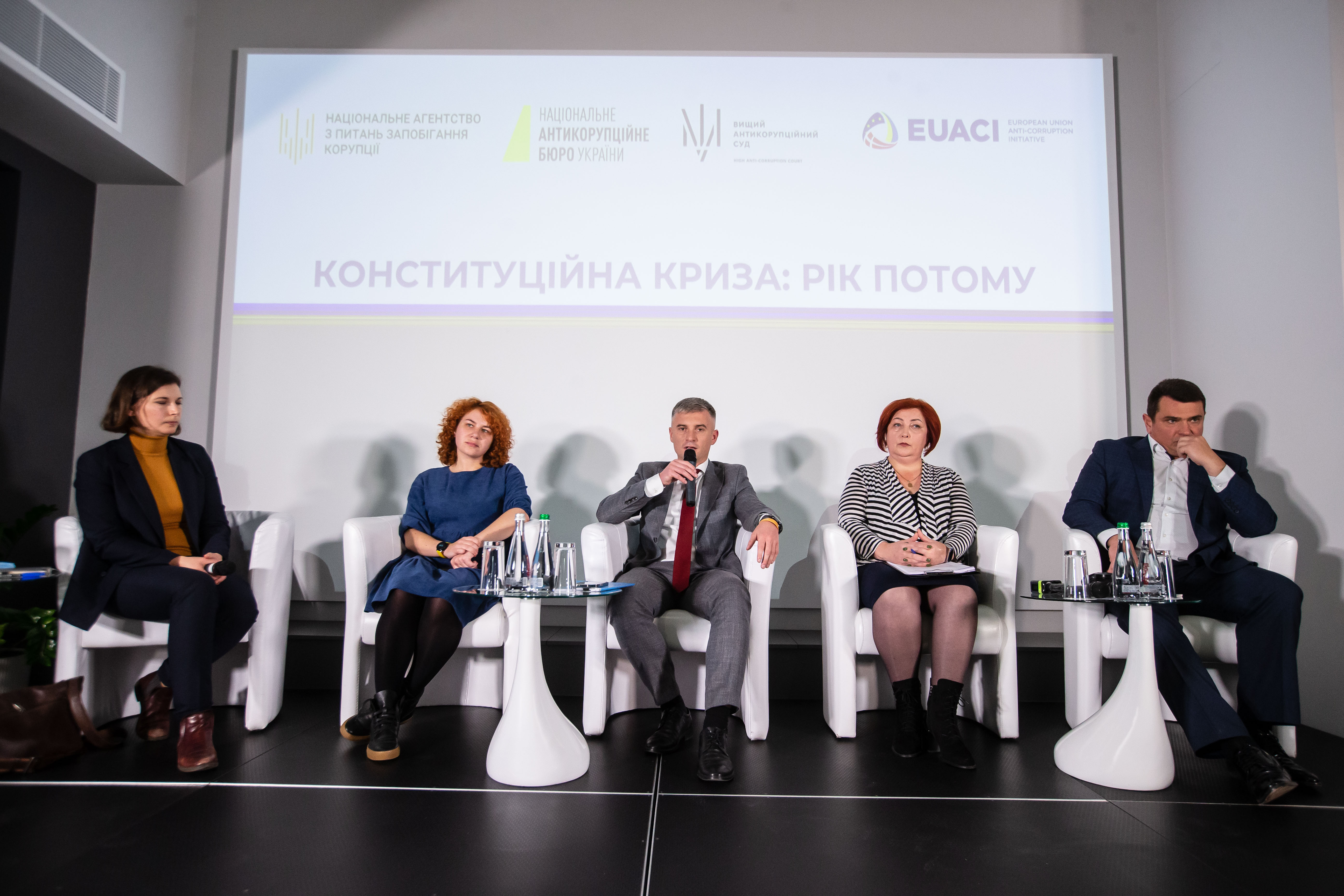
October 27, 2021, marks one year since the decision of the Constitutional Court of Ukraine (CCU) № 13-r / 2020, that affected Ukraine’s e-declaration system, blocked the work of the National Agency on Corruption Prevention (NACP) for three months, and threatened the functioning of the anti-corruption infrastructure.
To recall these events and discuss how to prevent such a situation from re-emerging in the future, representatives of anti-corruption bodies and civil society activists took part in the discussion “Constitutional Crisis: a Year After”.
Ambassador Matti Maasikas, Head of the EU Delegation to Ukraine commented with regards to the event: “Last year’s Constitutional Court decision had far-reaching consequences for Ukraine’s anti-corruption efforts and highlighted an urgent need for the reform of this court. A transparent, merit-based selection procedure for the selection of new CCU judges is key in ensuring its gradual renewal. This step, together with a temporary increase in the decision-making quorum, are among the most important recommendations of the Venice Commission and the right way forward. Unfortunately, we have not seen progress on this reform since the Venice Commission issued its urgent opinion on this matter in December 2020.”
At the opening of the event, the Head of the EU Anti-Corruption Initiative Allan Pagh Kristensen said, "This day is an important reminder that the architecture of anti-corruption institutions is fragile and may be jeopardised by a single event - a court decision”. Mr. Kristensen also emphasised that if the institutions are going to be strong and successful, they need professional independent leadership. “With two selection processes ongoing – head of SAPO and head of ARMA – and one upcoming – head of NABU – there is indeed a need once again to stress that these selections must be transparent and merit-based. And we stand ready to support and facilitate processes that live up to these criteria", he said.
"October 27 will forever go down in history as a “black day” not only for the NACP, but also for Ukrainian statehood. Like a day when citizens could lose control of the public service. As a dangerous day from the point of view of stability and security of the state, because corruption is one of the biggest internal threats to our country”, said Head of NACP Oleksandr Novikov.
He added that although the CCU’s decision for some time significantly weakened the anti-corruption system and threatened the past achievements of anti-corruption bodies, today these events should motivate further action to strengthen anti-corruption measures in the country, namely the completion of judicial reform and adoption of the Anti-Corruption Strategy.
Director of the National Anti-Corruption Bureau of Ukraine Artem Sytnyk stressed that in order to avoid such situations in the future, effective cooperation of all anti-corruption bodies is required.
"It seems that all these decisions are part of one plan. Its goal is to neutralize the anti-corruption infrastructure to protect political elites. Without the political will to tackle corruption, it is extremely difficult to fight this phenomenon", said the Director of NABU.
The Minister of Justice Denys Malyuska noted that there are potential dangers from the decisions of the CCU, as there are still no proper mechanisms for the responsibility of judges. "The point in the constitutional crisis can be put only after amendments to the Constitution," said Denis Malyuska.
The Chairwoman of the Verkhovna Rada Committee on Anti-Corruption Policy Anastasiia Radina reminded of the legislation adopted by the Parliament to resolve the constitutional crisis. "The Verkhovna Rada has restored anti-corruption legislation and passed all the laws necessary for the anti-corruption system to work, for all relevant bodies to have their powers and to enjoy an appropriate level of independence," Anastasia Radina concluded.
Olga Sovhyrya, MP and Permanent Representative of the Verkhovna Rada of Ukraine to the CCU, informed about the innovations of the draft law on the constitutional procedure that will promote the reform of the CCU.
The event is organized with the support of the EU Anti-Corruption Initiative that has been reducing corruption in Ukraine through the empowerment of state institutions, local authorities, civil society and investigative media since 2017.